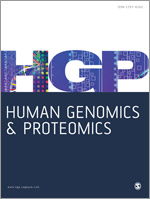Human Genomics and Proteomics
Human Genomics and Proteomics are two interrelated fields of biology that focus on the study of the genome and proteome of humans, respectively. These disciplines are central to understanding the molecular basis of life, disease, and evolution. They leverage high-throughput genetic sequencing and protein analysis technologies to explore the structure, function, and regulation of genes and proteins in the human body.
Human Genomics[edit | edit source]
Human genomics is the comprehensive study of the human genome, which includes the complete set of nucleic acid sequences for humans. This encompasses not only the vast amount of DNA contained within the chromosomes of the nucleus but also the mitochondrial DNA. The Human Genome Project, completed in 2003, marked a significant milestone in this field by providing a reference sequence of the human genome. This has facilitated advances in understanding genetic variation, genetic disorders, and the evolutionary history of humans.
Applications[edit | edit source]
The applications of human genomics are vast and include areas such as personalized medicine, where genetic information is used to tailor medical treatment to an individual's genetic makeup. It also plays a crucial role in genetic testing for inherited diseases, pharmacogenomics, and the identification of genetic predispositions to diseases such as cancer and heart disease.
Human Proteomics[edit | edit source]
Human proteomics involves the large-scale study of proteins, which are essential molecules that perform a vast array of functions within the body. Proteins are encoded by genes, and the proteome is more complex than the genome because a single gene can produce multiple proteins through processes like alternative splicing and post-translational modification. Proteomics seeks to catalog all proteins, understand their functions, and elucidate the complex networks of interactions in which they participate.
Applications[edit | edit source]
Proteomics has important applications in understanding disease mechanisms, identifying potential new drug targets, and biomarker discovery for disease diagnosis and prognosis. It is also crucial in the study of cellular processes and signaling pathways, contributing to the development of targeted therapies for various diseases.
Interrelation and Importance[edit | edit source]
The interrelation of genomics and proteomics is fundamental to systems biology, which aims to understand biological systems as a whole. By studying the genome, scientists can predict which proteins are produced in the body. Conversely, by studying the proteome, scientists can infer the activity of genes and the functional consequences of genetic variations. This holistic view is crucial for advancing our understanding of human biology, improving disease diagnosis, and creating more effective treatments.
Challenges and Future Directions[edit | edit source]
Despite the progress in human genomics and proteomics, several challenges remain. These include the complexity of genetic and protein interactions, the vast diversity of the human population, and the ethical implications of genetic information. Future directions involve integrating genomics and proteomics with other data types, such as metabolomics and transcriptomics, to achieve a comprehensive understanding of human biology.
Search WikiMD
Ad.Tired of being Overweight? Try W8MD's physician weight loss program.
Semaglutide (Ozempic / Wegovy and Tirzepatide (Mounjaro / Zepbound) available.
Advertise on WikiMD
|
WikiMD's Wellness Encyclopedia |
| Let Food Be Thy Medicine Medicine Thy Food - Hippocrates |
Translate this page: - East Asian
中文,
日本,
한국어,
South Asian
हिन्दी,
தமிழ்,
తెలుగు,
Urdu,
ಕನ್ನಡ,
Southeast Asian
Indonesian,
Vietnamese,
Thai,
မြန်မာဘာသာ,
বাংলা
European
español,
Deutsch,
français,
Greek,
português do Brasil,
polski,
română,
русский,
Nederlands,
norsk,
svenska,
suomi,
Italian
Middle Eastern & African
عربى,
Turkish,
Persian,
Hebrew,
Afrikaans,
isiZulu,
Kiswahili,
Other
Bulgarian,
Hungarian,
Czech,
Swedish,
മലയാളം,
मराठी,
ਪੰਜਾਬੀ,
ગુજરાતી,
Portuguese,
Ukrainian
Medical Disclaimer: WikiMD is not a substitute for professional medical advice. The information on WikiMD is provided as an information resource only, may be incorrect, outdated or misleading, and is not to be used or relied on for any diagnostic or treatment purposes. Please consult your health care provider before making any healthcare decisions or for guidance about a specific medical condition. WikiMD expressly disclaims responsibility, and shall have no liability, for any damages, loss, injury, or liability whatsoever suffered as a result of your reliance on the information contained in this site. By visiting this site you agree to the foregoing terms and conditions, which may from time to time be changed or supplemented by WikiMD. If you do not agree to the foregoing terms and conditions, you should not enter or use this site. See full disclaimer.
Credits:Most images are courtesy of Wikimedia commons, and templates Wikipedia, licensed under CC BY SA or similar.
Contributors: Prab R. Tumpati, MD

